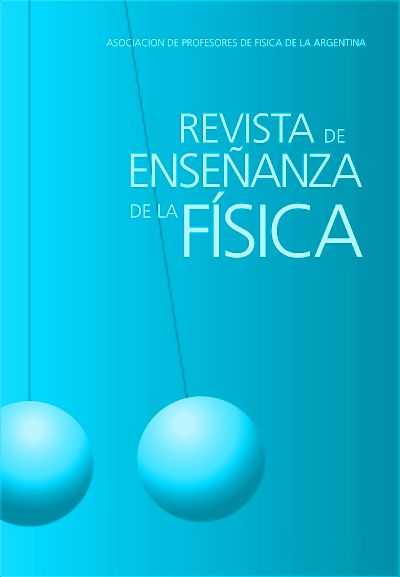Exploring the connection between problem solving and conceptual understanding in Physics
DOI:
https://doi.org/10.55767/2451.6007.v30.n2.22738Keywords:
Worked examples, Problem-solving, Conceptual understandingAbstract
This study probes whether problem solving ability is indicative of an understanding of the concepts underlying problem solutions. Low-performing students enrolled in an introductory mechanics course for scientists and engineers viewed an animated-narrated solution to a difficult problem in angular dynamics as preparation for an upcoming midterm exam. Immediately after viewing the solution, the students attempted to solve an isomorphic calculation-based problem and a conceptual question that probed whether students understood the concepts underlying the solution to the calculation-based problem. We found that ability to solve the calculation-based problem did not correlate with conceptual understanding. This suggests that, at least for low-performing students, problem solving and conceptual understanding in physics are different types of knowledge that develop independently, and as such, instruction should focus on the development of both types of knowledge rather than assuming that proficiency in solving complicated problems is indicative of conceptual understanding.
References
Blasiman, R. N., Dunlosky, J., y Rawson, K. A. (2017). The what, how much, and when of study strate-gies: Comparing intended versus actual study behavior. Memory, 25, 781-792. DOI: 10.1080/09658211.2016.1221974
Chi, M.T.H., Feltovich, P.J. y Glaser, R. (1981). Categorization and representation of physics problems by experts and novices. Cognitive Science, 5, 121-152.
Docktor, J.L. y Mestre, J.P. (2014). Synthesis of discipline-based education research in physics. Physical Review Special Topics: Physics Education Research, 10, (58pp). DOI: 10.1103/PhysRevSTPER.10.020119
Feil, A. y Mestre, J.P.(2010). Change Blindness as a Means of Studying Expertise in Physics. Journal of the Learning Sciences, 19(4), 480-505.
Freeman, S., Eddy, S.L., McDonough, M., Smith, M.K., Okoroafor, N., Jordt, H., Wenderoth, M.P. (2014). Active learning increases student performance in science, engineering, and mathematics. Proceedings of the National Academy of Sciences, 111(23), 8410-8415. doi: 10.1073/pnas.1319030111.
Hake, R. (1998).Interactive-engagement vs traditional methods: A six-thousand-student survey of me-chanics’ test data for introductory physics courses. American Journal of Physics, 66, 64-74.
Hartwig, M. K., y Dunlosky, J. (2012). Study strategies of college students: Are self-testing and scheduling related to achievement? Psychonomic Bulletin and Review, 19, 126-134. DOI: 10.3758/s13423-011-0181
Kryjevskaia, M., Stetzer, M.R., y Le, T.K. (2014). Failure to engage: Examining the impact of metacogni-tive interventions on persistent intuitive reasoning approaches. In P. V. Engelhardt, A. D. Churukian, and D. L. Jones (Eds.), 2014 PERC Proceedings (pp. 143-146). Minneapolis, MN, July 30-31. doi:10.1119/perc.2014.pr.032
Mayer, R.E. y Moreno, R. (2003). Nine ways to reduce cognitive load in multimedia learning. Education-al Psychologist, 38, 43-52.
Mayer, R.E. (2011). Applying the science of learning to multimedia instruction. In J.P. Mestre y B.H. Ross (Eds.), The Psychology of learning and motivation: Cognition in education, Vol. 55 (pp. 78-108). San Diego, CA: Academic Press.
Mazur, E.(1997).Peer Instruction: A User’s Manual. Upper Saddle River, NJ: Prentice Hall.
Mestre, J.P. (2002). Probing adults’ conceptual understanding and transfer of learning via problem pos-ing. Journal of Applied Developmental Psychology, 23, 9-50.
Mestre, J.P. (Ed.) (2005). Transfer of Learning from a Modern Multidisciplinary Perspective (393 págs.). Greenwich, CT: Information Age Publishing.
Scott, M., Stelzer, T. y Gladding, G. (2006). Evaluating multiple-choice exams in large introductory physics courses. Physical Review Special Topics: Physics Education Research, 2, (14 pp). DOI: 10.1103/PhysRevSTPER.2.020102
Stelzer, T., Brookes, D., Gladding, G., y Mestre, J. (2010). Impact of multimedia learning module on an introductory course on electricity and magnetism. American Journal of Physics, 78(7), 755-759. https://doi.org/10.1119/1.3369920
Stelzer, T., Gladding, G., Mestre, J. y Brookes, D.T. (2009).Comparing the efficacy of multimedia mod-ules with traditional textbooks for learning introductory physics content. American Journal of Physics, 77(2), 184-190. https://doi.org/10.1119/1.3028204
Downloads
Published
How to Cite
Issue
Section
License
Copyright (c) 2018 Jason W. Morphew, José P. Mestre

This work is licensed under a Creative Commons Attribution-NonCommercial-NoDerivatives 4.0 International License.
Aquellos autores/as que tengan publicaciones con esta revista, aceptan los términos siguientes:Los autores/as conservarán sus derechos de copiar y redistribuir el material, bajo los términos estipulados en la Licencia de reconocimiento, no comercial, sin obras derivadas de Creative Commons que permite a terceros compartir la obra bajo las siguientes condiciones:
- Reconocimiento — Debe reconocer adecuadamente la autoría, proporcionar un enlace a la licencia e indicar si se han realizado cambios. Puede hacerlo de cualquier manera razonable, pero no de una manera que sugiera que tiene el apoyo del licenciador o lo recibe por el uso que hace.
- NoComercial — No puede utilizar el material para una finalidad comercial.
- SinObraDerivada — Si remezcla, transforma o crea a partir del material, no puede difundir el material modificado.
- Los autores/as podrán adoptar otros acuerdos de licencia no exclusiva de distribución de la versión de la obra publicada (p. ej.: depositarla en un archivo telemático institucional o publicarla en un volumen monográfico) siempre que se indique la publicación inicial en esta revista.
- Se permite y recomienda a los autores/as difundir su obra a través de Internet (p. ej.: en archivos telemáticos institucionales o en su página web) antes y durante el proceso de envío, lo cual puede producir intercambios interesantes y aumentar las citas de la obra publicada. (Véase El efecto del acceso abierto).














